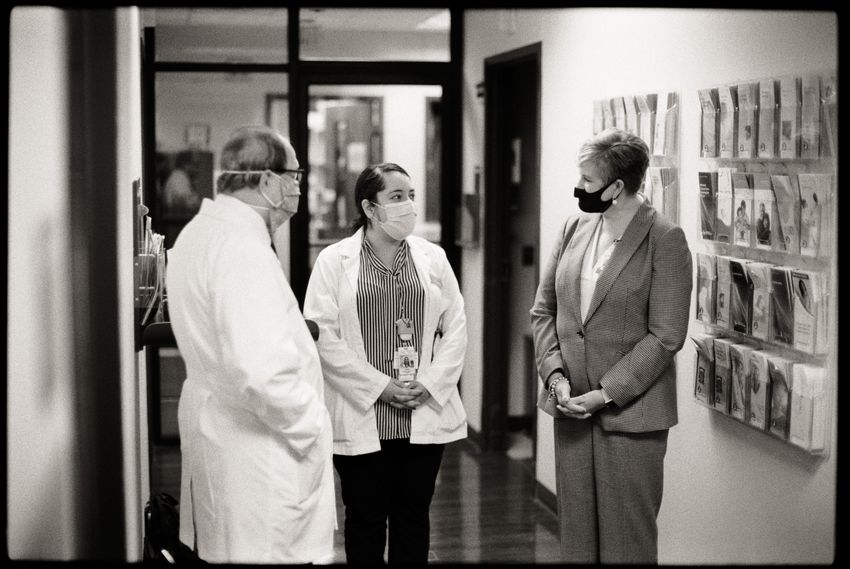Better health care at home
/https://static.texastribune.org/media/files/018d3ff55011f23296425a6ee5816321/first%20image.jpg)
By Lori Rice-Spearman, Ph.D., Texas Tech University Health Sciences Center
Lori Rice-Spearman, Ph.D., is the ninth president of Texas Tech University Health Sciences Center.
For more than two decades, the all-cause mortality rate for people living in rural areas of Texas has exceeded that of urban areas. Rural living itself is not the problem. Instead, there is direct correlation between rurality, socioeconomic factors and the affordability of and access to health care, according to a study published in Health Affairs by our team of experts from the F. Marie Hall Institute for Rural and Community Health.
As one of only two health research institutions located west of I-35 — both proudly part of the Texas Tech University System — Texas Tech University Health Sciences Center’s focus is on improving health outcomes through research-backed health care. Our purpose is to increase the number of health care providers in the region and bridge the gap in health disparities that lead to poor health outcomes. Part of that solution is to address the most pressing chronic diseases affecting those who live in this region: cancer, diabetes and heart disease.

While any chronic illness is of concern, diabetes has a significant burden on our state as a whole, but particularly in TTUHSC’s 108-county service area, which comprises more than half of the 191 Texas counties classified as rural by population status. About 3 million people live in the region that extends from the Texas Panhandle south to the Permian Basin and from the western state line almost to the Dallas-Fort Worth Metroplex. Together with our sister university, TTUHSC El Paso, we provide care for this region whose residents produce much of the food, fiber and fuel not only for our country, but also internationally.
The geographic expanse that contributes to the region’s economy is also a significant barrier to accessing quality health care. For some, a doctor visit can mean a four-hour drive each way. Barriers to access can lead to delays in seeking care and management of chronic conditions. For example, diabetes, which is prevalent in multiple generations in our region, poses a threat not only to one’s quality of life, but also can lead to more critical health complications including heart disease, stroke, kidney damage and nerve damage.
Diabetes affects 11.2% of the state’s population; however, those at greatest risk — Black and Hispanic people, and older adults — comprise the majority of rural populations. While the Texas Demographic Center reports diabetes rates in the western half of Texas to be on par with the national average (about 9% of the population), our region has a significantly lower physician-to-patient ratio. Socioeconomic factors in rural areas, including lower wages and salaries, unemployment, lack of health care insurance, and diet and nutrition, are also factors in the prevalence of diabetes and other chronic diseases in the region.
Research represents the greatest opportunity for innovation in health care delivery and to expand options related to prevention, intervention, treatment and case management of disease conditions.
TTUHSC has a diverse portfolio of research specialties and resources that impact health care. The Center of Excellence in Diabetes and Endocrinology at Odessa provides comprehensive education and research-backed care for patients with endocrine disorders. It is the only such center in the region with an interdisciplinary team that studies early diabetic conditions and develops treatment interventions to prevent irreversible complications. Internally, researchers across the TTUHSC enterprise have independent studies and synergies in diabetes, addiction and substance abuse, cancer, and biology and immunotherapy, focusing on disease factors and developing new treatments and therapies.
Additionally, in collaboration with Texas Tech University, a Tier 1 research institution in the TTU System, our faculty and students established a state-approved COVID-19 testing lab last spring that supports 67 counties in the region. We have identified multiple research opportunities between TTUHSC’s Jerry H. Hodge School of Pharmacy and TTU’s new School of Veterinary Medicine, which will open in fall 2021. TTUHSC’s Burn Center for Research Excellence has a symbiotic relationship with the only Level 1 Trauma Center in the region. The North Texas Clinical Pharmacology Cancer Core, at TTUHSC’s Dallas campus, provides research support for cancer trials at UT Southwestern Medical Center.
An investment from the Legislature through mission-specific formula funding is needed for expansion of TTUHSC’s research strengths. One example is expansion of telehealth. Waivers during COVID-19 helped bridge gaps in access to health care delivery; however, there is still much to learn regarding efficacy and reliability. Additionally, many rural areas lack broadband capabilities. As we continue to address barriers to accessing health care in rural areas, telehealth infrastructure and program delivery will have a significant role in our research efforts.
Ultimately, TTUHSC is focused on developing innovative concepts to improve health outcomes for people in the region we serve. However, we believe these advancements can also serve as models in other rural regions across the state.